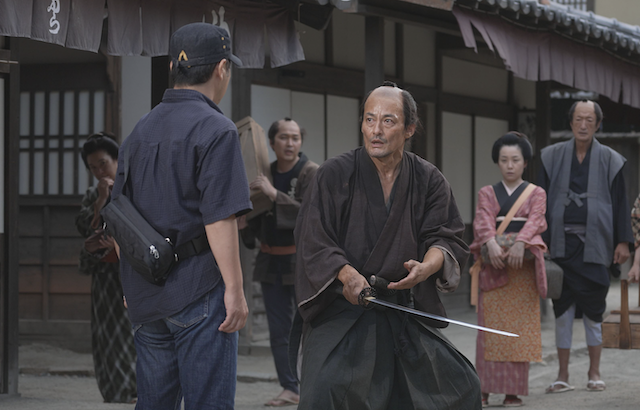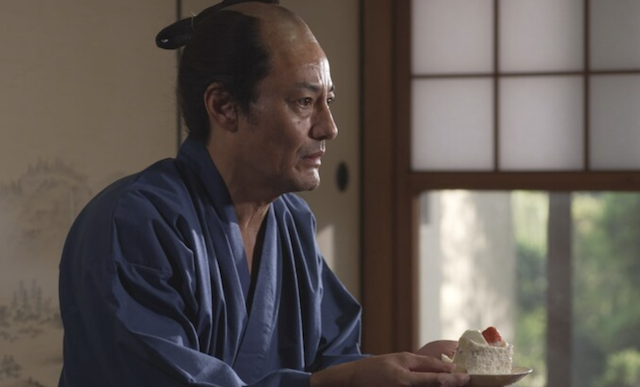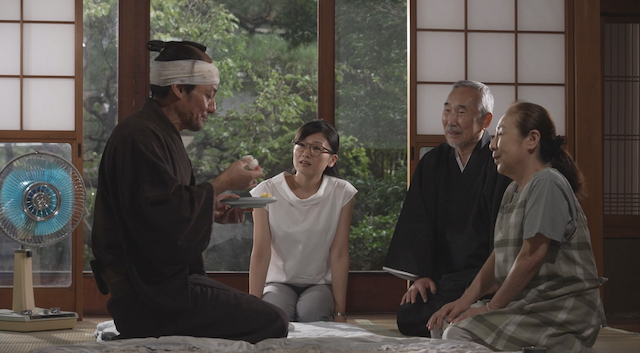
©Third Window Films

Q : I heard that you have a very small crew of 10 people, so how did you come up with the idea of making period pieces with such a small crew?
Junichi Yasuda: The first of our secrets is that we were actually able to rent a set at the famous Toei Studio in Kyoto. They are already pros at making [period pieces] so I was able to get the help of a producer over there to help me and I had two or three people help me [make the film]. But our main fuel was our passion. and the scenario that was already accepted at Toei.
As for lighting and things like that, as an indie director, I already know about most of the things that need to be done on a movie. So there were some things that I was able to do myself or keep simple. My main benchmark for this [production] is that I wanted to imitate as much as possible the quality of commercial films.
I was able to keep the cost down for example, with the camera and with the editing by attracting as much knowhow as I could around me, But just making do with what we have actually doesn’t mean that we had no problems doing it. We had a lot of problems, and people were getting mad at me almost every day.
Q : We’re not just talking about how you made an indie film prior to that. You kindergarten recitals, bridal shoots, and corporate videos in your actual job. Did those skill sets help you to make those actually indie films by yourself?
Junichi Yasuda: Okay. So by working with films this way, I think what it taught me is that instead of trying to show off how talented I am, it taught me to be looking for what people want to see and making what makes them happy. So instead of just puffing my chest and pretending like I made this big deal, I think it’s been keeping me really on the side of people who are watching.
Q : What was amazing about your job is that I heard that your father passed away recently. You are a filmmaker, but you were also making rice as a farmer as well. So talk about what it was like juggling around that task while doing a filmmaking job at the same time.
Junichi Yasuda: The government barely sends any help. I did my best to take care of all the rice fields. I did my best to make sure that [his life] didn’t go to waste. And I’m taking care of as much as I can to fulfill his heritage somewhat. I even made a movie about a rice maker–about this woman doing her best in her rice fields.

©Third Window Films
Q : Could you talk about casting the lead actor Makiya Ymaguchi, who did a lot of TV series in the past. How did you decide to cast him as a lead role?
Junichi Yasuda: Mainly two reasons. First, because he starred in a lot of movies, and he was starring next to famous people. He starred in TV shows that were played some time ago, so younger people these days tend to not recognize him very much.
This is a good thing because sometimes—even when I watch movies with famous actors that I recognize—sometimes I don’t see them as their characters but rather as themselves, which is something that I wanted to avoid.
So by hiring him, it’s like he was actually a samurai from the past brought to the present. I should also mention how good he is with his stance and with his sword play, and how good of an actor he is [overall].
Q : How did you create the character of a kirare-yaku (the actor played by a main character) instead of a lead actor?
Junichi Yasuda: I am familiar with Seizo Fukumoto, who is famous for his kirare-yaku, and I thought that it would be a little unrealistic for someone who lived in the world of period dramas to suddenly arrive in the modern age and become a star.
There are still a small number of people who play the role of a kirare-yaku and mixing them in with such characters is a rather realistic thing to do. He himself (as the character) is one with an honest and pure Edo period sensibility, so when he first blended in with the shooting, he was very impressed by their kirare-yaku techniques.
Moreover, he knows that in the modern age, people do not cut each other with swords, so he thinks he has found a master he can look up to, and even though there is nothing else he can do with his sword, he still wants to help make a heartbreaking historical drama by using it, and that is why he chose that kind of setting.
If you like the interview, share your thoughts below!
Check out more of Nobuhiro’s articles.
Here’s the trailer of the film.

